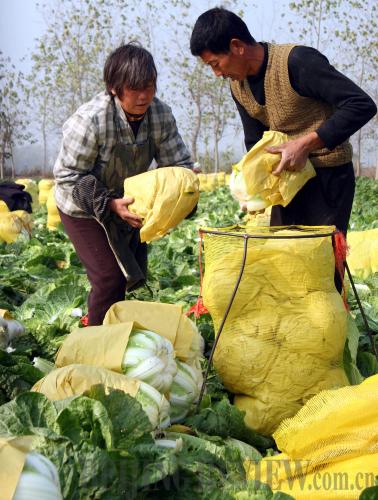|
 |
|
PRICES UP: Vegetable farmers in Mengcheng County, Anhui Province, reap their harvest. While farmers benefit little and retailers have to face high costs before they sell vegetables, other causes of price hikes must be carefully dealt with (XINHUA) |
Counterproductive Policy
Since the beginning of November, a diesel shortage has swept through China. It's reported more than 2,000 private gas stations in south China had to close down temporarily because of insufficient supplies.
This is not the first seasonal energy shortage in China. We can blame oil price fluctuations on the international market, rising production costs of refineries and transportation difficulties caused by typhoons in southern areas.
But the most important cause of the recent shortages is power cuts in several provinces aimed at meeting energy-saving goals, which have forced companies to buy diesel generators to keep operating.
Local governments' control of power supplies is aimed at saving energy and reducing carbon emissions. But the use of diesel generators has completely ruined these efforts. It tells us again the government should not put in place policies that run counter to the market.
Beijing Times
Clean Kitchens
In 2006, Xianyang in Shaanxi Province launched a "clean kitchen" program in three counties under its jurisdiction, which provides for officials to be fed at government kitchens. Since 2008, this program has expanded to other counties in the city.
The cost of government officials' lavish meals paid for out of public funds is estimated to have reached 900 billion yuan ($134.3 billion) a year. A great deal of corruption is related to these expansive spreads. Today, more than 1,300 townships throughout Shaanxi have built up government kitchens and the expenses for official receptions have dropped by more than 40 percent. Thanks to this practice, villages and townships have been relieved from the huge fiscal burdens of official receptions.
These kitchens not only help to reduce burden on governments, but they are also presenting a clean image of the government to the public. If more of these types of kitchens are set up around the country, more money can be spared out of huge administration expenses to do more tangible things for the public. Meanwhile, it's also important to establish an effective supervisory system so this practice can be sustained.
Legal Daily
Optimizing Resources
The Ministry of Education recently announced it was scrapping the surcharge immigrant students are required to pay to schools for enrollment, which is usually called the "sponsorship fee." This is the first time the ministry has set a timetable for the solution of the problem: three to five years.
Under heavy pressure from education authorities, public schools are very likely to acquiesce. But it's suspected schools accustomed to collecting various surcharges might have already worked out new items, given today's arbitrary fee charges in schools all over the country.
The scrapping of the sponsorship fee is significant, but more efforts should be made to optimize the distribution of educational resources in schools in different regions.
Why was the sponsorship fee widely charged? Because some prestigious schools possess first-class teaching staffs and facilities that most of the regular schools will never have. If this fundamental problem is neglected, even if the current sponsorship fee is eradicated, other problems will crop up.
In accordance with market rules, when demand outnumbers supply, the price of certain commodities or services will rise. When so many students are trying their best to get into a prestigious primary or middle school, the school will naturally turn to surcharges to raise its threshold.
As long as imbalanced educational resource distribution continues, the sponsorship fee problem will never be solved in any real sense.
Yangcheng Evening News
Vegetable Prices
Vegetable prices have skyrocketed around China during 2010. People have taken it for granted that vegetable farmers must have benefited from the price increases. But farmers have not seen much of an income rise at all. Then whose pocket does the huge amount fall into?
The unspoken rule in vegetable marketing is, from land to stalls, vegetable prices rise by 50 to 100 percent. On the face of it, retailers are increasing the prices, but when their accounts are revealed, they will win some sympathy.
Every month they have to pay hundreds or even thousands of yuan in stall rents, plus fees for market regulation, water, electricity, transportation and packaging. The costs of various items keep rising.
Retailers, if they do not raise prices for vegetables, will lose money. But market operators always receive huge profits and do not have to bother themselves with as many things as the vendors have to deal with. Market operators, as public service providers, can never be exempted from blame for higher and higher prices.
The priority with vegetable price hikes is to cut various fees and taxes imposed on vendors in the process of putting vegetables on stalls in markets, so as to keep prices stable and acceptable.
Dazhong Daily | 